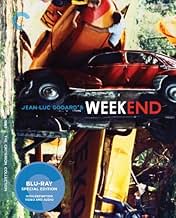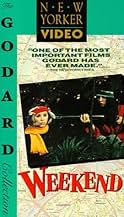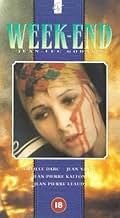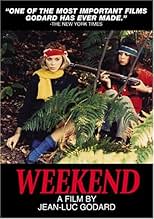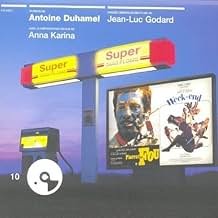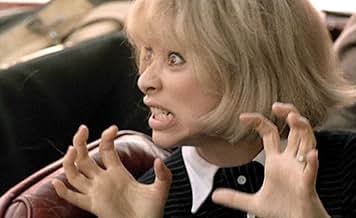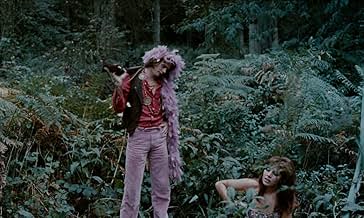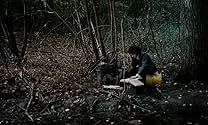AVALIAÇÃO DA IMDb
6,9/10
16 mil
SUA AVALIAÇÃO
Uma história surreal de um casal que faz uma viagem de carro para visitar os pais da esposa com a intenção de matá-los pela herança.Uma história surreal de um casal que faz uma viagem de carro para visitar os pais da esposa com a intenção de matá-los pela herança.Uma história surreal de um casal que faz uma viagem de carro para visitar os pais da esposa com a intenção de matá-los pela herança.
- Direção
- Roteiristas
- Artistas
- Prêmios
- 1 vitória e 4 indicações no total
Yves Afonso
- Gros Poucet
- (não creditado)
Yves Beneyton
- Un membre du FLSO
- (não creditado)
Juliet Berto
- Une activiste du FLSO
- (não creditado)
- …
Michèle Breton
- Girl in the woods
- (não creditado)
Michel Cournot
- Man From Farmyard
- (não creditado)
Lex De Bruijn
- Revolutionary
- (não creditado)
Jean Eustache
- L'auto-stoppeur
- (não creditado)
Jean-Claude Guilbert
- Le clochard
- (não creditado)
Paul Gégauff
- Le pianiste
- (não creditado)
Blandine Jeanson
- Emily Bronte
- (não creditado)
Louis Jojot
- Monsieur Jojot
- (não creditado)
Valérie Lagrange
- La femme du chef du FLSO
- (não creditado)
Jean-Pierre Léaud
- Saint-Just
- (não creditado)
- …
Ernest Menzer
- Ernest - le cuisinier
- (não creditado)
- …
Sanvi Panou
- Mon frère africain
- (não creditado)
- Direção
- Roteiristas
- Elenco e equipe completos
- Produção, bilheteria e muito mais no IMDbPro
Avaliações em destaque
Jean-Luc Godard's cruelly ironic portrayal of the apocalypse of Western civilization through automobile accidents and petty greed effectively marked the breaking point in his career; after this, he retreated into an overtly political militant cinema for most of the late sixties/early seventies, following some of the leads here first introduced. Whatever plot there is is slowly deconstructed and disassembled throughout the film's length, as a weekend drive by cynical bourgeois couple Mireille Darc and Jean Yanne turns into a surrealist, comic nightmare of roadkill, class struggle, murder and politics as they have to face the progressively more chaotic consequences of their blind ambition and desire for power. Strikingly photographed in long one-take tracking shots, the most celebrated of which showing an apparently endless traffic jam, the film seems to defend the revolt of the proletariat until, by the end, the bourgeois wife is down with the revolutionary Liberation Front of the Seine and Oise, in a cruelly ironic plot twist that literally underlines the cannibal side of politics. With hindsight, many say that "Week End", released in 1967, effectively announced the May '68 urban uprisings in Paris and marked the beginning of Godard's politically active phase; personally, I think that Godard sensed the winds of change and jumped on the political bandwagon as a means to find the drive for his cinema to grow. And the cool, cruel detachment he bestows on the politics on display is enough to prove that his irony has seldom been more incisive than when he's being revolutionary.
Jean-Luc Godard will always be Jean-Luc Godard. Either you love his films or hate them. Either you love the guy or hate him. Now, with "Weekend" (1967, France), I just don't know what to make of him (not that this is not what I generally feel whenever I see one of his films).
At the film's opening credits, it's outrightly declared that it's "a film adrift in cosmos". Godard must've meant that seriously, for once you've entered the film's universe, you're in for one wreck of a viewing experience. This is one chaotic universe--and I meant to say it in a pleasurable way!
To attempt to state the plot of the film could only be a disservice to it--though this is not to say that the film doesn't have a "plot"! To attempt to extract the essence of the film might only be a disgrace to it--though this is not to say that the film doesn't have an "essence"! To attempt to map out Godard's agenda in making the film could just turn out to be a mockery of the filmmaker--though this is not to say that the film doesn't have an "agenda"!
The plot? A couple goes on a weekend trip to their parents' house to execute a sinister plan....The essence? The decadence of bourgeois values, the arbitrary yet natural progression of fate, and the transformative power of social awakening....The agenda? For Godard to become increasingly political and to continue on deconstructing the traditional film narrative methods, and thus "alienating" the film audience.... (Much like, theater-wise, Bertolt Brecht had increasingly become political in his succeeding plays while at the same time had continued on employing "alienating" theatrical devices.)
But all of these takes a side-step to give way to the overwhelming chaos, arbitrariness and "playful" senselessness that truly characterize "Weekend". Or, perhaps, the "means" are designed to be of service to the "end".
This chaotic cosmos is potently embedded in the viewers' sensibilities by way of that jaw-droppingly sustained 10-minute dolly shot of a horrendous countryside traffic jam (the "mother of all traffic jams", as one film reviewer ably put it) that the above-quoted couple encountered on their way to Oinville (their parents' place). After that, the quirky and amoral couple would continue to meet along the way a whole lot of "hindrances" to their destination, most of which Godard leisurely takes his time to stage (as what he did, say, in "Alphaville" and "Band of Outsiders").
On the one hand, these "hindrances" appear to be a carry-over from the previous traffic jam that the couple went through (those car wrecks and corpses). On the other hand, they are intended to be an overt display of the filmmaker's alienating techniques (like at one point where the couple gets to encounter a pair of "fictional", "literary" characters and the man starts to blurt out how "trashy" the film is for all they meet are "crazy characters"--how hilarious!). On the other still, they serve as a venue for Godard's explicit political views, the expressiveness is of such a way that this may take the form of direct camera address (like in that long scene where these two "brothers" pour out their thoughts and sentiments about the oppression in South Africa and the discrimination of the blacks).
Now that I have mentioned things political, I'm not sure if it's even necessary to mention the political "awakening" that came upon the woman after the couple was kidnapped by a band of Communist guerrillas. The scenes comprising this specific episode tread the line of being absurd, grotesque and outrageous that seeing them can't even make one believe them.
The online Premiere magazine listed "Weekend" as one of the "25 Most Dangerous Movies". "Dangerous" in the sense of these films challenge our "bedrock notions" of what it is that we normally see in the movies and how we see them (with films like "A Clockwork Orange", "Eraserhead", "Requiem for a Dream", "Freaks"). It's a question of theme and method. Well, it's not that JLG's films have not always turned our viewing experience upside down. But when compared to, let's say, the ebullient fatalism of "Breathless", "Weekend" in fact exudes an apocalyptic melange and an irresolvable recklessness that make it rather an uncomfy fare.
The irony is that even if this Godard film is labeled as "dangerous", it's still worth a repeat viewing, much like all the other films that made it to the Premiere mag's list. It's one thing to say that this film poses danger and it's another to say that this film is "painful to watch twice". It's something that's worthy of another article--and actually there's an available list for that already!
At the film's opening credits, it's outrightly declared that it's "a film adrift in cosmos". Godard must've meant that seriously, for once you've entered the film's universe, you're in for one wreck of a viewing experience. This is one chaotic universe--and I meant to say it in a pleasurable way!
To attempt to state the plot of the film could only be a disservice to it--though this is not to say that the film doesn't have a "plot"! To attempt to extract the essence of the film might only be a disgrace to it--though this is not to say that the film doesn't have an "essence"! To attempt to map out Godard's agenda in making the film could just turn out to be a mockery of the filmmaker--though this is not to say that the film doesn't have an "agenda"!
The plot? A couple goes on a weekend trip to their parents' house to execute a sinister plan....The essence? The decadence of bourgeois values, the arbitrary yet natural progression of fate, and the transformative power of social awakening....The agenda? For Godard to become increasingly political and to continue on deconstructing the traditional film narrative methods, and thus "alienating" the film audience.... (Much like, theater-wise, Bertolt Brecht had increasingly become political in his succeeding plays while at the same time had continued on employing "alienating" theatrical devices.)
But all of these takes a side-step to give way to the overwhelming chaos, arbitrariness and "playful" senselessness that truly characterize "Weekend". Or, perhaps, the "means" are designed to be of service to the "end".
This chaotic cosmos is potently embedded in the viewers' sensibilities by way of that jaw-droppingly sustained 10-minute dolly shot of a horrendous countryside traffic jam (the "mother of all traffic jams", as one film reviewer ably put it) that the above-quoted couple encountered on their way to Oinville (their parents' place). After that, the quirky and amoral couple would continue to meet along the way a whole lot of "hindrances" to their destination, most of which Godard leisurely takes his time to stage (as what he did, say, in "Alphaville" and "Band of Outsiders").
On the one hand, these "hindrances" appear to be a carry-over from the previous traffic jam that the couple went through (those car wrecks and corpses). On the other hand, they are intended to be an overt display of the filmmaker's alienating techniques (like at one point where the couple gets to encounter a pair of "fictional", "literary" characters and the man starts to blurt out how "trashy" the film is for all they meet are "crazy characters"--how hilarious!). On the other still, they serve as a venue for Godard's explicit political views, the expressiveness is of such a way that this may take the form of direct camera address (like in that long scene where these two "brothers" pour out their thoughts and sentiments about the oppression in South Africa and the discrimination of the blacks).
Now that I have mentioned things political, I'm not sure if it's even necessary to mention the political "awakening" that came upon the woman after the couple was kidnapped by a band of Communist guerrillas. The scenes comprising this specific episode tread the line of being absurd, grotesque and outrageous that seeing them can't even make one believe them.
The online Premiere magazine listed "Weekend" as one of the "25 Most Dangerous Movies". "Dangerous" in the sense of these films challenge our "bedrock notions" of what it is that we normally see in the movies and how we see them (with films like "A Clockwork Orange", "Eraserhead", "Requiem for a Dream", "Freaks"). It's a question of theme and method. Well, it's not that JLG's films have not always turned our viewing experience upside down. But when compared to, let's say, the ebullient fatalism of "Breathless", "Weekend" in fact exudes an apocalyptic melange and an irresolvable recklessness that make it rather an uncomfy fare.
The irony is that even if this Godard film is labeled as "dangerous", it's still worth a repeat viewing, much like all the other films that made it to the Premiere mag's list. It's one thing to say that this film poses danger and it's another to say that this film is "painful to watch twice". It's something that's worthy of another article--and actually there's an available list for that already!
This was the culmination of almost seven years of work for Godard; arriving at a point in which his command of the film-making process was at its most confident and his talent as both a satirist and a grand provocateur could be channelled into making his ultimate statement - about society, cinema and the future of both - in such a way as to act as the bridge between the work that came before, and the work that would eventually follow. With Week End (1967), the intention was to confront the audience with the ultimate depiction of bourgeois decadence in all its morally-bankrupt banality; extending on the ideas behind his previous film, the complicated 2 or 3 Things I Know About Her (1967) - in which prostitution was used as a metaphor for a vapid consumer society willing to confine itself to ineffective action, whilst simultaneously selling itself out for the comfort of life's little luxuries - and all the while creating a merciless parody of the decline of western civilisation in a way that seems frighteningly close to the world that we live in today.
Throughout the film, Godard maintains a tone that is both serious and sardonic; showing us the morally-bankrupt nature of these characters and the mechanisms of the society in which they exist, while simultaneously creating an almost apocalyptic depiction of the end of society brought down by selfishness, consumerism, cannibalism and more. Alongside these particular themes, Godard layers in rudiments of social satire, contemporary French politics, the air of revolution - as hinted towards in the preceding send-up of La Chinoise (1967) - and a less than subtle reliance on Marxist ideologies to tie the whole thing together. Combine these elements with the director's continually provocative approach to film-making - including his typically unconventional use of music, inter-titles, crash cuts, tracking shots, pop-art inspired iconography and jarringly beautiful primary colours, all tied together by the always polarising appropriation of Brecht - and you have a film that is nothing less than progressive, defiant and utterly unique. All of these devises are used to disorientate the audience in a way that makes the viewing of the film as uncomfortable as possible; as scenes drag on and on while the camera explores the often absurd and abstracted tableau of scenes and scenarios in a way that seems to assault the senses of those of us more familiar with the conventional (i.e. bland) films still being produced by Hollywood to this very day.
With this in mind, many approach Week End as anti-narrative film; somehow implying that the film lacks the required elements of plot or character. However, this simply isn't the case. Although it as a far removed from conventional cinema as you could possibly get, there is still a definite narrative to be followed here; with central characters, themes and the traditional idea of characters moving towards a certain set goal as the film progresses. However, there's no attempt to pander to the notions of genre or convention; with Godard instead using satire, allegory, metaphor, pastiche and deconstruction to create several separate avenues of interpretation that all lead back to the central comment on the nature of society in the year nineteen sixty seven. At the time of its release, Week End was seen as a stark comment on the way society was heading, and without question Godard was spot on in his depiction of a world sold out and cast adrift, consumed by consumption its very self and eventually reaching the point at which all forms of expression break down, and are replaced by barbaric savagery, cynicism and self-delusion.
You could argue that most viewers dislike the film simply because it challenges them to think carefully about their own actions and the way they live their lives; with Godard all the while offering his amusing, provocative and highly satirical condemnation of a vapid society, personified by the parasitic creation of Roland and Corrine, a couple so truly fuelled by consumption and greed that the plot itself practically hinges on the question of whether or not they would resort to killing an elderly relative simply for financial gain. Although heavily stylised and overblown for purposes of surrealist humour, Roland and Corrine offer a mirror image of contemporary society at its very worst; predicting a number of currently relevant notions such as the loss of tradition, honour, family and respect, as well as the ultimate destruction, disregard and dismissal of concepts such as art, culture and history. Look around you and you'll see the social relevance of Week End, not simply as a satirical piece, but as a work of pure, abstract prophesy. Society may not have descended to the level of cannibal revolutionaries in the literal sense; but in the regurgitation of violence, horror, sensationalism, scandal, greed and consumption we feed off the carcass of the twentieth century and continue to ask for more.
These themes are expressed in the form of an episodic road movie, continually stylised and colour coded in reference to the traditions of the French flag - with its noble references to liberty, equality and fraternity turned into purposely banal expressions of on-screen agitprop - with even the most profane elements of the plot captured with all the pastoral, idyllic warmth of a traditional picture postcard. The themes and ideas behind the film run so much deeper than this review could ever suggest, with Godard creating one of the most interesting, exciting and entirely radical films of this period. It is difficult and it does take work; however, the sheer weight of Godard's ideas, the intelligence of his vision and the relevance of his themes make it a more than worthwhile experience. Give it time, and you might realise that much of the film is satire at its most wicked. It's also a great deal of fun, and has a number of fantastic scenes that just get better and better with each consecutive viewing.
Throughout the film, Godard maintains a tone that is both serious and sardonic; showing us the morally-bankrupt nature of these characters and the mechanisms of the society in which they exist, while simultaneously creating an almost apocalyptic depiction of the end of society brought down by selfishness, consumerism, cannibalism and more. Alongside these particular themes, Godard layers in rudiments of social satire, contemporary French politics, the air of revolution - as hinted towards in the preceding send-up of La Chinoise (1967) - and a less than subtle reliance on Marxist ideologies to tie the whole thing together. Combine these elements with the director's continually provocative approach to film-making - including his typically unconventional use of music, inter-titles, crash cuts, tracking shots, pop-art inspired iconography and jarringly beautiful primary colours, all tied together by the always polarising appropriation of Brecht - and you have a film that is nothing less than progressive, defiant and utterly unique. All of these devises are used to disorientate the audience in a way that makes the viewing of the film as uncomfortable as possible; as scenes drag on and on while the camera explores the often absurd and abstracted tableau of scenes and scenarios in a way that seems to assault the senses of those of us more familiar with the conventional (i.e. bland) films still being produced by Hollywood to this very day.
With this in mind, many approach Week End as anti-narrative film; somehow implying that the film lacks the required elements of plot or character. However, this simply isn't the case. Although it as a far removed from conventional cinema as you could possibly get, there is still a definite narrative to be followed here; with central characters, themes and the traditional idea of characters moving towards a certain set goal as the film progresses. However, there's no attempt to pander to the notions of genre or convention; with Godard instead using satire, allegory, metaphor, pastiche and deconstruction to create several separate avenues of interpretation that all lead back to the central comment on the nature of society in the year nineteen sixty seven. At the time of its release, Week End was seen as a stark comment on the way society was heading, and without question Godard was spot on in his depiction of a world sold out and cast adrift, consumed by consumption its very self and eventually reaching the point at which all forms of expression break down, and are replaced by barbaric savagery, cynicism and self-delusion.
You could argue that most viewers dislike the film simply because it challenges them to think carefully about their own actions and the way they live their lives; with Godard all the while offering his amusing, provocative and highly satirical condemnation of a vapid society, personified by the parasitic creation of Roland and Corrine, a couple so truly fuelled by consumption and greed that the plot itself practically hinges on the question of whether or not they would resort to killing an elderly relative simply for financial gain. Although heavily stylised and overblown for purposes of surrealist humour, Roland and Corrine offer a mirror image of contemporary society at its very worst; predicting a number of currently relevant notions such as the loss of tradition, honour, family and respect, as well as the ultimate destruction, disregard and dismissal of concepts such as art, culture and history. Look around you and you'll see the social relevance of Week End, not simply as a satirical piece, but as a work of pure, abstract prophesy. Society may not have descended to the level of cannibal revolutionaries in the literal sense; but in the regurgitation of violence, horror, sensationalism, scandal, greed and consumption we feed off the carcass of the twentieth century and continue to ask for more.
These themes are expressed in the form of an episodic road movie, continually stylised and colour coded in reference to the traditions of the French flag - with its noble references to liberty, equality and fraternity turned into purposely banal expressions of on-screen agitprop - with even the most profane elements of the plot captured with all the pastoral, idyllic warmth of a traditional picture postcard. The themes and ideas behind the film run so much deeper than this review could ever suggest, with Godard creating one of the most interesting, exciting and entirely radical films of this period. It is difficult and it does take work; however, the sheer weight of Godard's ideas, the intelligence of his vision and the relevance of his themes make it a more than worthwhile experience. Give it time, and you might realise that much of the film is satire at its most wicked. It's also a great deal of fun, and has a number of fantastic scenes that just get better and better with each consecutive viewing.
Wow, such a polarizing film! It seems everyone either detests this work as something less than terrible or conversely praise it to the heavens. I guess I'm sadly somewhere in between. Having read a bit of theory behind the film before I saw it I won't rehash that here, only state my reaction, for if there's anything this picture cries out for it is a reaction. Well here goes. Parts are horrifying. Far more disturbing than slasher film gore (mostly because the imagery being dispensed with aren't human). Parts are boring (and NOT the ten minute tracking shot which was a gem. Has anyone even been in a traffic jam before? Godard merely replicates it and all the while makes you wonder where that couple's car is heading, and what could have caused such a jam). Parts don't make sense, mostly because I don't think they are supposed to. That is their purpose, to disrupt sense. And, surprisingly something that nobody on here has mentioned, parts are very very funny. Okay, so perhaps not everyone will laugh as often as I did, but please, lighten up kids, Godard is making fun of us, its healthy to laugh at oneself once and a while. And some of his film is just fun too. Okay, now go back to the other reviews of how hopelessly miserable you'll feel after watching this, or how much of a religious awakening this will be if your down with the art-house film-erati. Definitely worth seeing.
'Week End' is a poor attempt to mix highbrow political attacks with a lowbrow sensibility from one of cinema's great artists. Here we have Jean-Luc Godard at both his most political, and his most experimental, throwing together ideas about Marxism, cannibalism and consumerism, and not caring one little bit whether or not the audience understands his angle of attack, or even his reason for it. Beginning the film with juvenile captions like "a film adrift in the cosmos" and "a film found on a dump", 'Week End' desperately tries to set up a nonchalant attitude to politics, society and the role of the filmmaker, but instead, simply smacks of pretension.
Godard's early movies demonstrated both a love and understanding for the medium for which he both embraced and reinvented, at the same time producing a number of classic films. However, sometime during the mid-sixties Godard became less interested in linear storytelling, and more concerned with empty provocation, which is illustrated clearly in 'Week End'. The disjointed, often rambling 'plot' follows a young Parisian couple, Roland and Corrine. Both at the height of the swinging-sixties revolution -- they openly have affairs, and delight in telling each other about their seedy escapades in sordid detail. When sex isn't motivating them, money is, or at least the prospect of money. So much so, when the chance arrives to visit Corrine's dying father, they plot to finish the old man off, and then reap the benefits of the inheritance. An odious act you might say, but up until this point the film has been quite interesting, almost enjoyable, showing us a very witty deconstruction of our preconceptions of the modern Parisian couple. But as the pair hit the road, Godard takes his message and proceeds to whack the viewer square in the face with it.
Beginning with the in/famous ten-minute tracking shot (following Roland and Corrine as the try desperately to negotiate a traffic jam on a county road), their journey takes them on an episodic odyssey that is supposed to represent a symbolic cleansing for the characters. As the film progresses they witness bizarre fairytale people who preach liberalistic nonsense, all manner of unexplained car crashes, raving lunatics and a band of terrorists. All this is supposed to strip away Roland and Corrine's bourgeois façade, making them pure human beings again. The message is blunt, unsubtle and heavy-handed, without the mindless consumerism of modern society, man and woman can function purely, as they where meant to. But despite Godard's self-confidence, it is unclear from the film where his own political allegiance lies. It would seem he feels strongly in favour of anti-commercialism/anti-consumerism, but his argument is fatuous -- and lacking sufficient and believable ammunition to back it up -- his only alternative to everyday modern life would seem to be joining a band of cannibalistic terrorists. Or maybe this was a metaphor for society's often-violent ways.
On a plus side, 'Week End' sees Godard at his most primitive, both stylistically and visually. He composes each frame with the brightest of colours, has his actors speaking monologues directly to camera, and then the aforementioned, long, unbroken tracking shots. Of course despite having an interesting quality, these stylistic flairs mean absolutely nothing. It's merely Godard's attempt to make the audience pay attention to what the characters are saying -- but since they are all speaking pure drivel it would seem to have been a bad move. By the time the film reaches its inevitable, ambiguous climax, the whole event becomes all the more tiresome. As Godard runs out of things to say (which is long after the film ceased to make sense of its ideas), he begins building up images of collective degradation and supposed black-comedy satire, neither of which work successfully... and I haven't even mentioned the acting yet.
The only decent performance you'll find that is even remotely worth watching (i.e. not entirely detestable a characterisation), is Jean-Pierre Léaud's double cameo as 'saint-just'/'singing man in phone box'. He is an extremely likable actor, familiar to audiences as the young Truffaut-alike in 'The 400 Blows'. Unlike the other cast members (with the exception of Mireille Darc as Corrine), he is clearly in sync with Godard's particular filmmaking style, and for a brief moment, makes the film almost enjoyable. I feel bad criticising Godard like this, he is a rare filmmaker, and one who has never been afraid to speak his ideas courageously -- demonstrated by the list of relevant issues here -- but they are just not communicated well enough. It's a great shame then that Godard had to make his film so heavy-handed in its ideals, and so excruciatingly slow in pace that it fails to work on any real, important level. A huge disappointment 2/5
Godard's early movies demonstrated both a love and understanding for the medium for which he both embraced and reinvented, at the same time producing a number of classic films. However, sometime during the mid-sixties Godard became less interested in linear storytelling, and more concerned with empty provocation, which is illustrated clearly in 'Week End'. The disjointed, often rambling 'plot' follows a young Parisian couple, Roland and Corrine. Both at the height of the swinging-sixties revolution -- they openly have affairs, and delight in telling each other about their seedy escapades in sordid detail. When sex isn't motivating them, money is, or at least the prospect of money. So much so, when the chance arrives to visit Corrine's dying father, they plot to finish the old man off, and then reap the benefits of the inheritance. An odious act you might say, but up until this point the film has been quite interesting, almost enjoyable, showing us a very witty deconstruction of our preconceptions of the modern Parisian couple. But as the pair hit the road, Godard takes his message and proceeds to whack the viewer square in the face with it.
Beginning with the in/famous ten-minute tracking shot (following Roland and Corrine as the try desperately to negotiate a traffic jam on a county road), their journey takes them on an episodic odyssey that is supposed to represent a symbolic cleansing for the characters. As the film progresses they witness bizarre fairytale people who preach liberalistic nonsense, all manner of unexplained car crashes, raving lunatics and a band of terrorists. All this is supposed to strip away Roland and Corrine's bourgeois façade, making them pure human beings again. The message is blunt, unsubtle and heavy-handed, without the mindless consumerism of modern society, man and woman can function purely, as they where meant to. But despite Godard's self-confidence, it is unclear from the film where his own political allegiance lies. It would seem he feels strongly in favour of anti-commercialism/anti-consumerism, but his argument is fatuous -- and lacking sufficient and believable ammunition to back it up -- his only alternative to everyday modern life would seem to be joining a band of cannibalistic terrorists. Or maybe this was a metaphor for society's often-violent ways.
On a plus side, 'Week End' sees Godard at his most primitive, both stylistically and visually. He composes each frame with the brightest of colours, has his actors speaking monologues directly to camera, and then the aforementioned, long, unbroken tracking shots. Of course despite having an interesting quality, these stylistic flairs mean absolutely nothing. It's merely Godard's attempt to make the audience pay attention to what the characters are saying -- but since they are all speaking pure drivel it would seem to have been a bad move. By the time the film reaches its inevitable, ambiguous climax, the whole event becomes all the more tiresome. As Godard runs out of things to say (which is long after the film ceased to make sense of its ideas), he begins building up images of collective degradation and supposed black-comedy satire, neither of which work successfully... and I haven't even mentioned the acting yet.
The only decent performance you'll find that is even remotely worth watching (i.e. not entirely detestable a characterisation), is Jean-Pierre Léaud's double cameo as 'saint-just'/'singing man in phone box'. He is an extremely likable actor, familiar to audiences as the young Truffaut-alike in 'The 400 Blows'. Unlike the other cast members (with the exception of Mireille Darc as Corrine), he is clearly in sync with Godard's particular filmmaking style, and for a brief moment, makes the film almost enjoyable. I feel bad criticising Godard like this, he is a rare filmmaker, and one who has never been afraid to speak his ideas courageously -- demonstrated by the list of relevant issues here -- but they are just not communicated well enough. It's a great shame then that Godard had to make his film so heavy-handed in its ideals, and so excruciatingly slow in pace that it fails to work on any real, important level. A huge disappointment 2/5
Você sabia?
- CuriosidadesThe tracking shot of the traffic jam was the longest tracking shot in the history of cinema at that point in time as it was 300 meters long.
- Versões alternativasFor the original U.S. theatrical release, distributor Grove Press dubbed the monologues (the garbagemen's piece on black revolution and the hippie's "ocean" poem) into English, although the rest of the film was in the original French with subtitles. A short credits sequence was also appended to the end of the film.
- ConexõesEdited into Bande-annonce de 'Week End' (1967)
Principais escolhas
Faça login para avaliar e ver a lista de recomendações personalizadas
- How long is Weekend?Fornecido pela Alexa
Detalhes
Bilheteria
- Orçamento
- US$ 250.000 (estimativa)
- Tempo de duração
- 1 h 45 min(105 min)
- Mixagem de som
- Proporção
- 1.66 : 1
Contribua para esta página
Sugerir uma alteração ou adicionar conteúdo ausente

